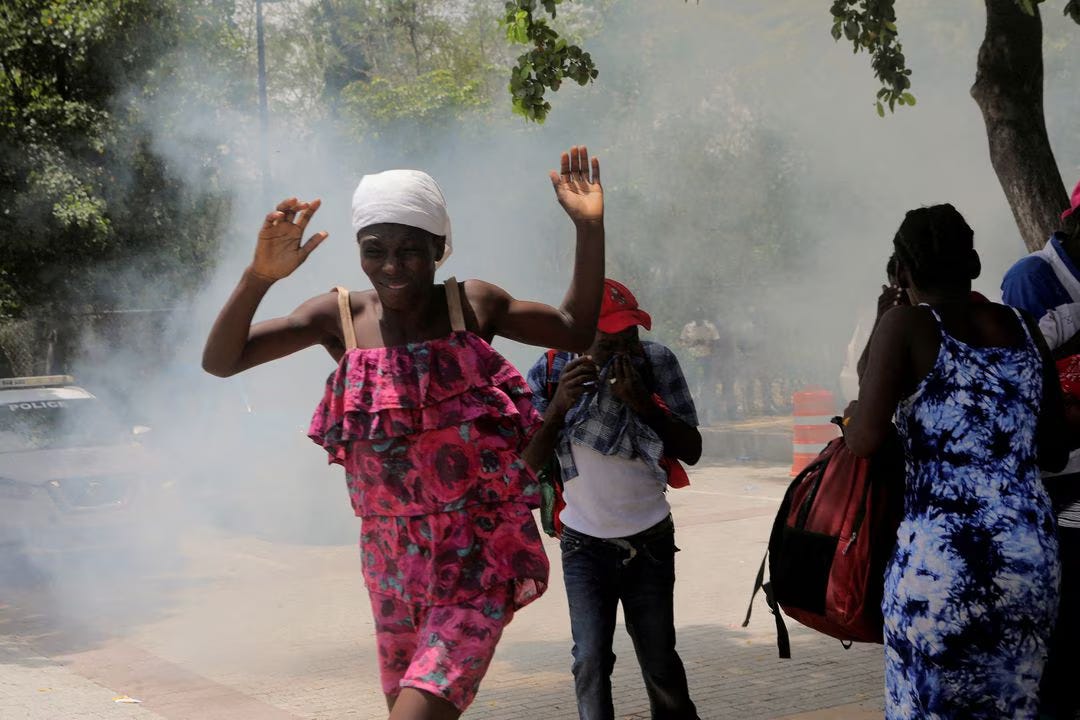
Kenya’s government said it is ready to lead a multinational force into Haiti and send 1,000 police officers to help the country deal with its deteriorating security situation, reports the Miami Herald. Haiti’s government welcomed the Kenyan offer, Saturday, which called it “an excellent development.”
Interim prime minister Ariel Henry requested an international security mission last October — a motion backed by the United Nations — but no country had yet stepped up to lead such a force.
The offer coms amid a deadly resurgence of gang violence following a lull in recent months. The U.S. State Department ordered the evacuation of non-emergency U.S. government personnel and diplomatic family members from its embassy in Haiti late last Thursday. and advised all U.S. citizens to leave the country as soon as possible amid rising gang violence, reports the Washington Post.
The move came after a week in which Haitians from the surrounding neighborhood swarmed the area outside the embassy seeking protection from gang violence. The crowd was forced off the embassy’s compound by Haitian police, using tear gas, reports the Miami Herald. Outside of the capital, another gang also attacked the population and set fire to an independent police station.
A U.S. citizen nurse and her daughter were abducted last week, the latest kidnapping episode to draw international notice, amid the country’s ongoing struggles with rampant gang violence, reports the New York Times. (See also Washington Post.)
Kenya’s offer still needs to be approved by the U.N. Security Council, which earlier this month gave Secretary-General António Guterres until August 15 to report back on options to improve the security situation in Haiti, including a possible U.N. peacekeeping force and a non-U.N. multinational force.
Petro’s son arrested
Colombian authorities arrested Nicolás Petro, the son of President Gustavo Petro, on Saturday, on charges of money laundering and illicit enrichment.
The case could test the country’s judicial system, reports the Washington Post, and comes amid a series of scandals impacting the Petro administration. Petro said on social media that it was painful for one of his children to be jailed, but that the attorney general's office had all guarantees to proceed according to the law.
The younger Petro, a politician in Atlantico province, had welcomed the investigation when it began in March. He said accusations that he took money from drug traffickers in exchange for including them in his father's peace efforts to end civil strife unfounded and harmful, reports Reuters.
Nicolás Petro’s ex wife, Daysuris Vásquez was also arrested yesterday. In March she said in a media interview that the younger Petro received large amounts of money from drug traffickers and smugglers in 2022 for his father’s presidential campaign but instead used it finance a lavish lifestyle. (AFP)
In the interview with Semana, Vásquez detailed how she was present at meetings when her then-husband arranged a donation of more than $150,000 from a politician once convicted in Washington of drug trafficking and who was seeking the Petro campaign’s support to resume his political career.
She said President Petro was unaware of her son’s dealings and the money he collected in his campaign’s name was kept inside a safe inside the couple’s home in the coastal city of Barranquilla, reports the Associated Press.
This latest scandal will likely further undermine the Petro adminsitration’s ability to pass reforms, reports the New York Times.
Regional Relations
South American countries have largely avoided picking sides in the conflict between Russia and Ukraine, reports the New York Times. ”Longstanding views that a multipolar, less-Western global order is in their best interests have prompted governments to oppose the fighting but reject attempts to isolate Russia diplomatically, impose economic sanctions or supply weapons to Ukraine.”
Chilean President Gabriel Boric is an exception, he has vocally condemned Russian aggression — his stance responds reputational, material and sovereignty concerns, writes Daniela Sepulveda in El País.
An FBI contractor purchased and deployed a spying tool made by NSO, the contentious Israeli hacking firm, for use by the U.S. government. This particular tool, known as Landmark, allowed U.S. government officials to track people in Mexico without their knowledge or consent, reports the New York Times.
Brazilian justice officials said they can’t approve a U.S. request to extradite an alleged Russian spy because they have already been processing Moscow’s own request for Sergey Cherkasov, reports the Washington Post.
Brazil
Hundreds of people participated at a gathering convened Kayapo chief Raoni Metuktire in Piaraçu, in the Amazon, this weekend. It was ostensibly a birthday party for the Indigenous and environmental activist in his nineties, but the meeting aimed to amplify the voice of Indigenous people who have the best proven record of maintaining forests and protecting biodiversity, reports the Guardian.
Many participants “noted how disturbed the climate has become, with Indigenous shamen observing that the rivers were “sad”, depleted beyond normal levels,” reports the Guardian.
A last-minute personal donation from a climate-concerned British farmer enabled the meeting to occur last week, reports the Guardian.
Colombia
The island of Providence is governed by Colombia, but has more in common with the English-speaking Caribbean. Now the local Raizales fear that redevelopment following a devastating 2020 hurricane could threaten their way of life, reports the Guardian.
Argentina
A citizen group from Argentina’s San Juan province will present today in a federal court a petition signed by 71,000 people to request the start of the oral and public trial for a 2015 cyanide spill at the Veladero mine in 2015. (Primera Mañana)
A targeted industrial policy is needed to help efforts to encourage sustainable growth of medium cities in Argentina, writes Federico Poore in Cenital, looking at a software hub that has revitalized the rural city of Tandil, and talking with Tomás Bril Mascarenhas of Fundar.
Peru
A Peruvian ethically-sourced wig making project in Cusco — Guardian.




